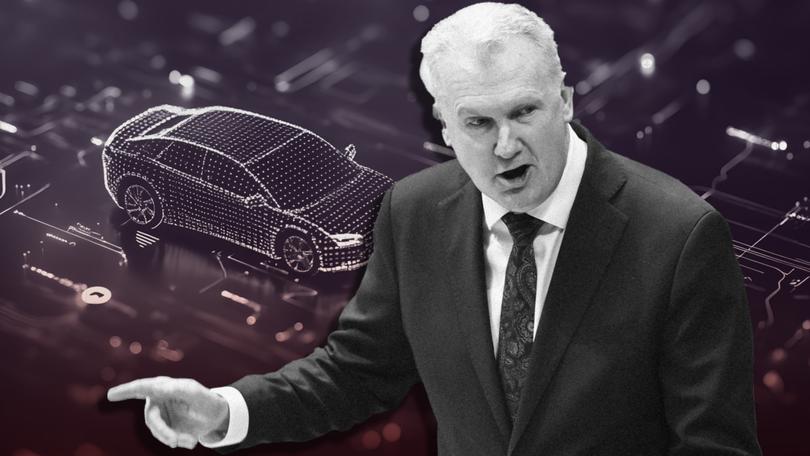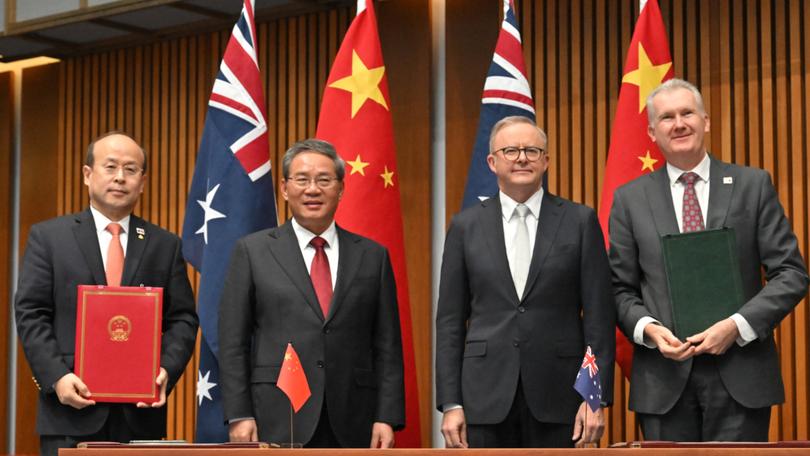Home Affairs Minister’s Chinese EV drives ‘real fear’ for national security
Coalition Senator James Paterson is demanding answers over Tony Burke’s Chinese-made electric car and what national security implications this could raise

Coalition Senator James Paterson has pressed the Government for answers on whether the Home Affairs Minister Tony Burke currently drives a Chinese-made electric car and what national security implications this could raise.
The shadow home affairs minister returned to the question in the Senate’s legal and constitutional affairs committee estimates this week after first raising concerns last November associated with the sensitive nature of the Home Affairs portfolio.
Security experts have increasingly warned of the possible dangers posed by Chinese-made EVs and all “connected vehicles” generally, flagging their potential to act as listening and surveillance devices, as well as record sensitive information including GPS data.
Sign up to The Nightly's newsletters.
Get the first look at the digital newspaper, curated daily stories and breaking headlines delivered to your inbox.
By continuing you agree to our Terms and Privacy Policy.In January, the outgoing Biden administration finalised rules for a sweeping ban on key Chinese software and hardware in connected vehicles on American roads in stages starting from 2027, citing national security threats.
During Monday’s hearing, Mr Paterson demanded details from Labor Employment Minister Murray Watt about previous revelations that Mr Burke drove a Chinese-made electric vehicle in a personal capacity.
Mr Watt declined to reveal the type of car driven by Mr Burke but stressed the Home Minister “takes the position that he shouldn’t and does not discuss sensitive matters in any car”.
Officials confirmed that oral advice on a “range of mitigations” had been offered to the minister, principally that official work-issued devices should not be plugged into connected vehicles.
But they indicated that he had not been specifically advised on whether he could connect a personal phone or drive to secure facilities.
“Anyone should look at the risks and assess the risks,” said one government adviser on general guidelines for public servants.
“When you look at things like connection of personal devices to cars, of course any internet connection creates an added vulnerability,” he said, referring to the “mosaic effect” of foreign intelligence agencies seeking a range of classified and unclassified information to build a bigger picture.
“Wouldn’t it be safer if he didn’t drive a potential listening advice around?” quipped Mr Paterson.
No answer was offered.
The Nightly approached the Home Minister’s office for comment and spoke to three independent cyber security experts.
All agreed that more action had to be taken to address the growing security risks posed by connected vehicles.
“Chinese smart vehicles are equipped with hundreds or even thousands of sensors that collect real-time information on vehicle status, road conditions, and passenger behaviour. This data is often sent directly to Beijing,” said Tilla Hoja, an analyst with the Australian Strategic Policy Institute (ASPI).

The vehicle systems were connected to Chinese clouds to which they transmit data, added Mr Hoja.
“This clearly poses national security risks. It’s difficult to see how a federal minister can use a Chinese-made smart car without incurring these risks.”
Mobile apps or personal devices linked to those China-made EVs technically connected to China’s “smart city” platforms via cloud computing systems, allowing the misuse of data in ways that could expose personal privacy and sensitive information for exploitation, he added.
Dr Miah Hammond-Errey, CEO of Strat Futures and an adjunct Associate Professor at Deakin University said the national security risks for a high-profile figure using a Chinese EV or any connected vehicle were “real”.
“Chinese EVs — just like the western advertising industry and data economy — enables whoever purchases or accesses data to track, target and surveil individuals, including our political, defence and national security leaders,” she said.
High profile individuals must be “particularly mindful about the level of data collection and surveillance in all environments, including in Chinese owned or manufactured vehicles,” she added.
In terms of mitigation, Australia should boost legislation to improve privacy protections and develop a whole of government mechanism to assess security risks in software, hardware and their supply chain proliferate.
Unlike Mr Hoja, Dr Hammond-Errey did not advocate US-style outright bans of specific technology from particular countries without a “well-evidenced threat,” arguing it would be better to regulate the dangers.
Dr Dennis Desmond, a cyber security expert from the University of the Sunshine Coast, called for a more robust evaluation of the “tempest” emanations, or electronic signals, emitted from EVs, that could be rich ground for intelligence agencies.
“Australia has placed itself in a difficult position by not having domestic vehicle production, especially for its political figures,” he said.
“You would have to assume that any vehicle used by any member of the government, whether shadow or current, has gone through a rigorous evaluation and a rigorous Tempest shielding,” he added.
Australia “needs to devote a lot more resources to looking at the technology threats that these vehicles represent.”

